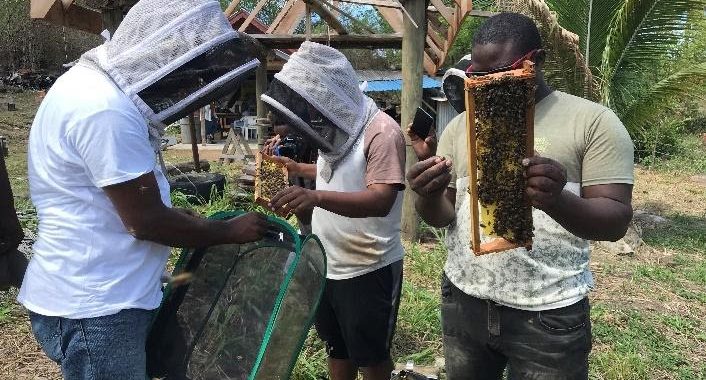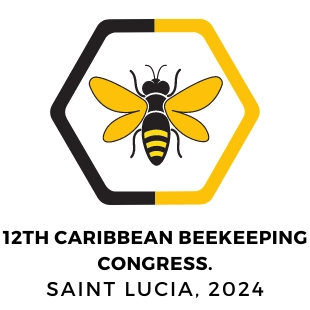Regional Apiculture and Biodiversity Project
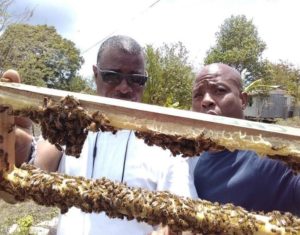
Beekeepers at work. (Courtesy Richard Matthias, St. Lucia).
Apiculture has been a part of the culture and social fabric of the Caribbean and Samoa for hundreds of years. From the 16th to 19th centuries, beekeeping became an integral part of the plantations, however, with independence and modernisation, this tradition slowly began to fade into history. The lack of appreciation of pollinators, especially bees, has resulted in a depletion of populations in many countries. This presents an important opportunity for marrying conservation of biodiversity and ecosystems, with sustainable livelihoods, thereby bringing benefit to people and the environment.
In 2019, The Global Environment Facility (GEF) Small Grants Programme (SGP) St. Lucia developed a project to bring beekeeping to the forefront within the Southern Hemisphere, mostly in the Caribbean. They were successful in receiving a grant to implement an innovation programme, with South-South cooperation, in the field of Apiculture in seven participating countries namely St. Lucia, St. Vincent and the Grenadines, St. Kitts and Nevis, Dominica, Grenada, Samoa (South Pacific) and Trinidad and Tobago. This initiative will see the development of a south-south regional apiculture industry, with all participating countries benefiting from the competitive advantage brought about by collective efforts of production of hive and hive products.
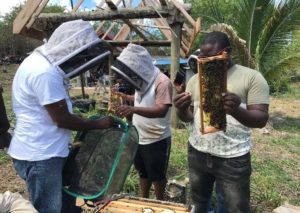
Selection of drones for semen harvesting. (Courtesy Richard Matthias, St. Lucia).
The central thesis of this project concept is that Apiculture provides SIDS with options for sustainable enterprises development while strongly promoting the rehabilitation and conservation of the terrestrial biodiversity, protection of soils, reduction of turbidity rates in rivers and the coastal zone, and protection of coral reefs. This initiative hopes to couple conservation of at least one protected area, with sustainable livelihood opportunities that reduce the aforementioned threats and develop greater partnership amongst stakeholders within and amongst Caribbean countries.

Beekeepers from the Brasso Seco Community. (Picture courtesy Richard Matthias).
The initiative will provide capacity development in apiculture to participants across the entire Caribbean. Due to COVID-19, the capacity development strategy has been adapted to a hybridized model which will see the development of the South’s first online beekeeping course. This course will provide important knowledge on beekeeping, honey and hive products to enrollees. The capacity development will be supported by in-country mentors, who will support the online content with important field exercises. This course will be available to beekeepers and enthusiasts, even after the project is completed, at no cost to the user, so that they can develop and further their skills. This course is being developed with the support and cooperation of a number of key stakeholders from across the region, including The University of the West Indies, St. Augustine; Sir Arthur Lewis Community College (St. Lucia); Ministry of Planning and Development, Trinidad and Tobago; the Bureau of Standards (St. Lucia) and the Ministry of Agriculture, St. Lucia.

Sylvester Hernandez & Richard Matthias Reviewing colonies in Basso Seco.
Another important deliverable for this project is the development of a data and knowledge management system for apiculture. This will be achieved through the development of a South-South Beekeeping App, which will provide Caribbean and Pacific beekeepers with a cost effective, user-friendly portal to store important apiculture monitoring data for improving hive management.
The initiative will also provide beekeepers across the region with all the tools and equipment they would need to start-up or expand their operations in all seven countries. Each country will receive 120 hives as well as the tools, suits and other equipment to expand the production of honey in each country.
With the long term in mind and the need for ongoing training in the future, this initiative will also fund the establishment of the Apiculture Research and Learning Institute (ARLI) to ensure that sound scientific research is continuous and there is a place with a high reputation for aspiring. Apiculturists from all participating countries and other countries, to be trained at the basic, intermediate and advanced levels. The ARLI will be located in the Makote Mangrove, on the east coast of St. Lucia, and will serve as a centre for research and innovation, especially in terms of hive value-added natural products.
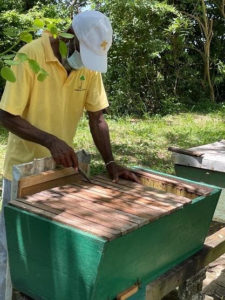
ACBO Vice President inspecting a top bar hive in Tobago.
GEF SGP envisions that, through the investment of training and resources from this initiative, that the Caribbean region can become a major competitor for honey and hive products on the international market. With rich forage year round, this initiative promises a sustainable supply of products internationally which, it is hoped will bring financial support and relief for the participating SIDS. With dwindling revenues due to lack of tourism, the development of the apiculture industry is an important, sustainable diversification avenue for the economies of these south countries, which are hard hit by COVID and other natural disasters.
GEF SGP Trinidad and Tobago is supporting this project by contributing to the online course and app development as well as providing representation of national interests on the Project Advisory and Technical Committee (PATEC). The project has already begun the online course, which it hopes will be completed by May 20th, World Bee Day. The project has also begun development of the app, which was launched last year at the Association of Caribbean Beekeeping Organizations (ACBO) Regional Congress in November 2020. This year, 2021, promises to be a very exciting year for beekeeping across the region. Please look out for further updates in our subsequent newsletters.

